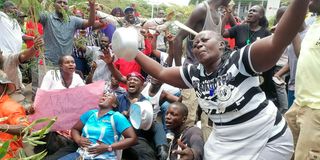The rights to picket, demonstrate, petition and democracy

Kisumu residents take to the streets to protest against the rising cost of living on March 15, 2023.
The ongoing maandamano has tested the relationship between the sovereigns (i.e. citizens of Kenya), two organs of national security – the National Police Service and the national intelligence service, and elected representatives.
At play is how the police service is expected to guarantee the enjoyment of rights. Fundamental to the democratic enterprise are the rights to picket, demonstrate and petition.
These rights make it possible for the citizens to seek to persuade a public official over an action – such as controlling inflation - which they want the public official to take.
One role of all three national security organs, particularly the police service, is to facilitate the enjoyment of those rights, not to thwart them.
The government side would do well to look at ongoing demonstrations in other countries. In France, protests have sometimes turned into violent confrontations. In one city – Nantes, a bank branch was set on fire. But we have not heard of police shooting the demonstrators.
In various conversations over the last two weeks, I have been struck by the denial of current problems, and the blame game. But what has astonished me the most is the language in use. So, I shall start there. Many officials, senior police officers and politicians have been saying, “I won’t allow” or “we won’t allow”. Frankly, fundamental rights are not yours to “allow” citizens to enjoy! My enjoyment of them requires no permission from you.
"Police Force"
Another frequently used term is the “Police Force”. There is no such organisation in Kenya today. There is, however, a National Police Service, one of three security organs created by the Constitution. The others being the National Intelligence Service and the Kenya Defence Forces.
The wording of the Constitution is deliberate. The National Police Service is expected to act in an impartial manner, and not promote, nor prejudice, any political cause. The service is to all Kenyans. The term “service” signifies, no doubt, that the police would no longer be an instrument of state oppression.
So, what should the service do during the demos or anywhere where a large number of citizens gather? The things necessary to enhance the safety of the citizen. Traffic control for one. Vigilance against criminal elements. Emergency services.
Now to one of the issues and the blame game. The cost of living is high and rising. The government’s response is that they have stabilized the economy.
Well, with the shilling losing 30 per cent of its value in the last 5 months, and inflation still above 9 per cent, tell it to the birds! The government has also claimed to be handling the cost of living by supporting food production with subsidised fertilizer.
Thanks, but except the katumani variety, maize will take six months to harvest, and citizens need food now.
The government side has tried to downplay the cost of living, saying that things were worse when their opponents were in power. This is both false, and also shooting themselves in the foot. Governments are elected to solve problems.
Then, there are self-inflicted wounds, that raise fears of a Zimbabwe-type land grab. Leading government figures have threatened political opponents with the destruction of their farmlands and property.
Shortly afterwards, at least two farmlands and a factory have been attacked. Observers fear that this may escalate, and with dire consequences. Landowners in Laikipia, for example, will recall the horrors of farm invasions from 2017.
All this to deny the citizens a right guaranteed to them by the constitution!
@NdirituMuriithi is an economist




